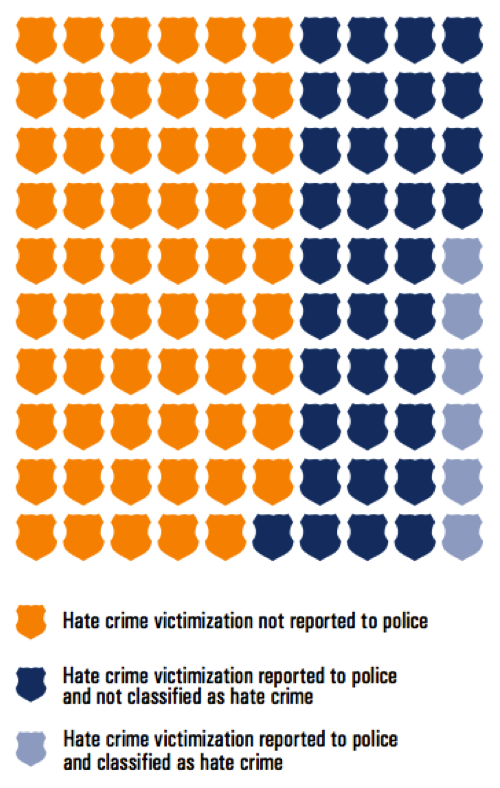Fighting Hate with Data: Releasing Open Hate and Bias Crime Data

As the movement for law enforcement agencies to release open data grows, one category is growing with it: open data on hate and bias crimes.
Hate crimes are criminal offenses that are motivated to some extent by the offender’s bias. Unlike traditional criminal offenses that victimize individuals, hate crimes victimize entire groups and are highly traumatic for both individuals and communities. Although 'hate crime' is a particularly harmful classification of offenses, it is not well documented in the United States. Underreporting of hate crimes is a major challenge to law enforcement’s ability to effectively address the issue. According to the Bureau of Justice Statistics, between 2003 and 2015, 41% of hate crime victimizations of individuals age 12 or older were brought to the police and of the 104,600 victimizations that were reported, only 14% were classified as a hate crime and reported to the UCR.
Individual law enforcement agencies are uniquely poised to address hate crime reporting by releasing open data on hate and bias crimes. As standard practice, law enforcement agencies already collect and store granular information about hate crimes. Making the data open can help local communities understand that these crimes are being treated seriously, narrow the reporting gap and diminish other challenges associated with hate crimes, and improve the public’s understanding of hate crimes nationwide. Recognizing this, some police departments have already taken the initiative to release open data on hate crimes.
Lincoln, Nebraska
Publishing open data about hate crimes… reassures the public that their police department has systems in place to identify and investigate hate crimes.
Public Safety Director Tom Casady, City of Lincoln
Last month, the City of Lincoln, Nebraska, released multiple open datasets on their open data portal, including open data on hate crimes. Pulling the data from the Lincoln Police Department Records Management System, the datasets provide incident-level information on criminal incidents spanning from 2010 to 2016 where the investigating officer believed that the offense was motivated to some extent by bias or hatred. The City of Lincoln data portal also provides a table of codes, including hate crime fields, to help members of the public interested in analyzing or just learning more about the data to better understand the data fields.

Director of Public Safety in Lincoln, Nebraska, Tom Casady, believes that, "Publishing open data about hate crimes sends the message that the police take these crimes seriously, and endeavors to make information about the nature and extent of hate crime available to citizens. It reassures the public that their police department has systems in place to identify and investigate hate crimes."

Louisville, Kentucky and Bloomington, Indiana
Other Police Data Initiative members that have released open data on hate crimes include the Bloomington Police Department (BPD) and Louisville Metro Police Department (LMPD). BPD identified a hate crime dataset as being relatively easy to produce as the department sought to embrace transparency and build community engagement through the release of open, incident-level data. Similarly, LMPD recognized that as an early adopter of the FBI’s UCR Program using the National Incident-Based Reporting System (NIBRS), a hate crime dataset would be valuable to the community and relatively easy to prepare. Additionally, recognizing that some members of the public may not be familiar with working with data, LMPD created a Transparency Page with insights into the department’s open data and has participated in data-themed events bringing together community coders and government representatives to use open data for problem-solving.
It has helped reduce fear in vulnerable communities.
Assistant Chief Robert Schroeder, Louisville Metro Police Department
More on Louisville and Bloomington and their lessons learned from releasing open hate crime data will be released in the Police Foundation’s upcoming publication, Releasing Open Data on Hate Crimes: A Best Practices Guide for Law Enforcement Agencies.
Open Hate Crime Data
As Lincoln, Louisville, and Bloomington have experienced, by releasing open hate crime data, tribal, local, state, and federal jurisdictions can immediately improve the public’s understanding of hate crime nationwide and encourage official reporting of these crimes on the part of citizens as well as the police. More accurate data can then better inform policymakers and law enforcement agencies to assign resources for the prevention and resolution of these crimes.
In recognition of the importance of hate crime data collection and reporting, the Police Foundation is asking law enforcement agencies across the country to commit to releasing open data on hate crimes. Our challenge will run through March 1, 2018 when we hope to reach the goal of 50 U.S. law enforcement agencies releasing open data on hate and/or bias crime (incidents, arrests, or other similar data is eligible). We believe that when law enforcement agencies release open data on hate crimes, they demonstrate their commitment to addressing these often violent crimes and contribute to improving public safety.
Using the data is a good segue into discussing the bigger problems.
Chief Michael Diekhoff, Bloomington Police Department
If your agency or city would like to learn more about releasing open data, or to take part in this challenge, let us know at PDI@policefoundation.org.
If you liked this post, please share!
